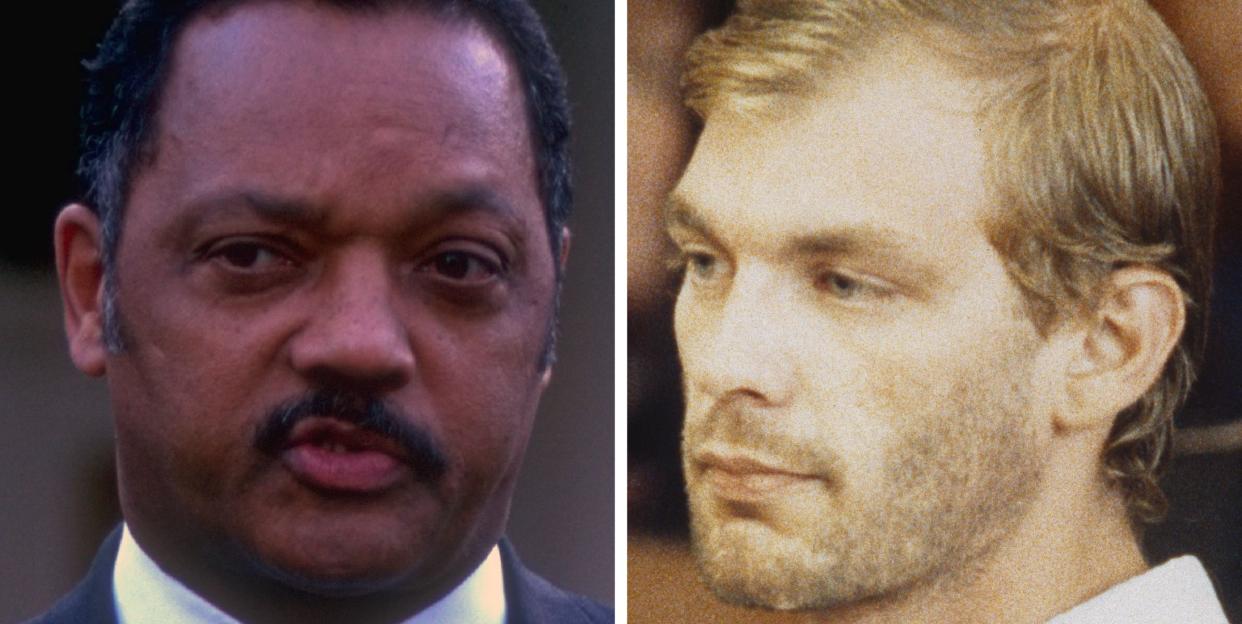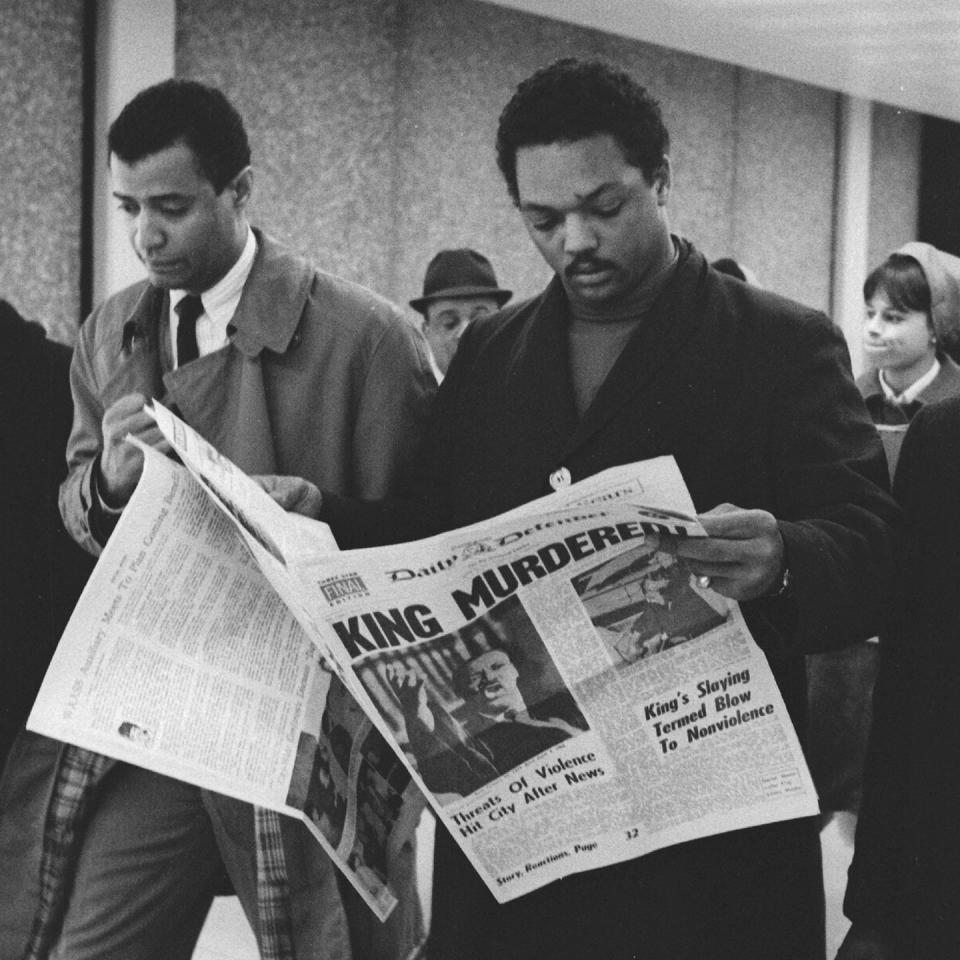Here's Why Reverend Jesse Jackson, Sr., Spoke Out Against The Milwaukee Police After The Jeffrey Dahmer Case

- Oops!Something went wrong.Please try again later.
- Oops!Something went wrong.Please try again later.
"Hearst Magazines and Yahoo may earn commission or revenue on some items through the links below."
This article contains references of murder and sexual assault some may find upsetting
DAHMER - Monster: The Jeffrey Dahmer Story — the limited series on Netflix created by American Horror Story's Ryan Murphy — has probably been all over your feeds and maybe group chats lately. Not only is the show, which headlines Evan Peters as the notorious serial killer who murdered 17 boys and men of color or Black from 1978 through 1991, topping Netflix’s charts but it’s also been in the news after receiving criticism from the families of Dahmer's victims and queer audiences.
With Jeffrey Dahmer's father, Lionel, featured in a 2020 televised interview, his mother Joyce having passed away in 2000, and his brother David living in anonymity, you may be wondering what happened to other key players in the show, such as Reverand Jesse Jackson, Sr., the civil rights activist who briefly appeared in episode eight of the series. After Dahmer's capture, Jackson visited Milwaukee to speak out against the handling of the case as well as the double standard the local police held for Black and white citizens.
Ahead, learn about Reverend Jesse Jackson, why he traveled to Wisconsin, and where Glenda Cleveland fits into his story.
Who is Jesse Jackson?
Reverend Jesse Louis Jackson is a civil rights activist, who made history as the second Black presidential candidate in 1984, where he won five primaries and caucuses for a total of more than 3 million votes, History.com reports. According to Standford University's Martin Luther King Jr. Research and Education Institute, the former member of the Southern Christian Leadership Conference member, he was seen as a protégé of civil rights activist Martin Luther King Jr. Jackson was even present when he was assassinated on April 4, 1968.

Jackson founded the National Rainbow Coalition in 1983. According to History.com, the organization was created to "restore a moral tone, a redemptive spirit and a sensitivity to the poor and the dispossessed" to Reagan-era America.
Why did Jesse Jackson come to Milwaukee?
After Dahmer was arrested on July 22, 1991, when a man escaped from Jeffrey's apartment and flagged down a police car, Jackson headed to Milwaukee in August 1991 to meet with local Black and POC community members and address negligence by police officials. Jackson's goal was to discern whether discrimination or racism may have played a role in the investigation and to identify how the police failed the victims. In particular, according to the Milwaukee Journal Sentinel, police officials failed to save 14-year-old Konerak Sinthasomphone, who Dahmer had kidnapped. When the dazed and naked Sinthasomphone escaped to get help, the authorities returned the boy to Dahmer, who had convinced the officers that the young teen was his 19-year-old boyfriend (despite Glenda Cleveland, Dahmer's Black neighbor, advising police that something was wrong).
Who did Jesse Jackson meet during his visit?
According to the Associated Press, Jackson met with Mayor John O. Norquist during his trip to Milwaukee. Following that meeting, Jackson said that he was "in no position to judge" Police Chief Philip Arreola in spite of his department's negligence. Later, Jackson hosted a church rally with approximately 1,000 people, where they chanted, "Keep hope alive." Jackson called for a thorough investigation on a local, state, and national level to examine racist practices and oversights like the ones in Dahmer's case. "There must be some results from the investigation, and there must be some remedy," he added.
Jackson also met with Cleveland, where he also said, "Police chose the word of a killer over an innocent woman," in a statement obtained by the Milwaukee Journal Sentinel.
Is Jesse Jackson's rally speech on the Netflix series accurate?
In the eighth episode of the Netflix series, Jesse Jackson addressed a large crowd of people who came on a peace walk in support of Jeffrey's victims and Glenda Cleveland, speaking out against police indifference, saying “Today, the city of Milwaukee is hurting. Jeffrey Dahmer’s heinous crimes have not only shocked the nation, they’ve inflicted a painful, devastating wound on this community."
"Now, some folks have asked me ‘Reverend why you going out to Milwaukee? Dahmer’s been caught aren’t you just stirring up more division?’ to those folks I say I come here today not to sow division but to call for accountability," he continued.
Jackson added: "Dahmer’s crimes weren’t committed in a vacuum, many people including officers of the law turned a blind eye which is why he was able to do what he did for so long.”
While Jackson's real-life speech from the gathering echoes the same sentiments as the march scene in the show, it is not completely accurate. Instead, he said, "And so we must take the energy and anger here and turn that anger into some constructive plan, for hope, and for a new Milwaukee."
Jackson then lays out the plans for the march, saying "We are going to visit Mrs. Cleveland for a moment. The lady who was so heroic and so caring. In the meantime, let's stay together."
Footage from Jackson's speech at the real-life protest is available on YouTube.
Where is Reverand Jesse Jackson now?
Now 80, Reverand Jesse Jackson still works as an American civil rights leader, Baptist minister, and politician, per Rainbow PUSH Coalition. He resides with his wife Jacqueline Lavinia "Jackie" Jackson in the Chicago area. According to ABC7 Chicago, Jackson is undergoing treatment for Parkinson's — a neurological disease that has no cure and is a progressive disorder, where mobility and speech decline over time.
You Might Also Like

